|
|
|
Sort Order |
|
|
|
Items / Page
|
|
|
|
|
|
|
| Srl | Item |
| 1 |
ID:
152078
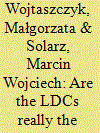

|
|
|
|
|
| Summary/Abstract |
The term ‘the least developed countries’ (LDCs) is widely understood to designate, exactly as stated, the world’s least developed countries. In conjunction with the 2015 United Nations (UN) triennial review of the LDC category, this article attempts to critically evaluate the UN’s list of LDC countries in the light of various indicators – economic, social, political, military and security related, and psychological. It concludes that the official and actual lists of LDCs, despite important similarities, are not completely identical. The term ‘the LDCs’ as used by the UN is therefore not fully consistent with the reality it attempts to designate and describe.
|
|
|
|
|
|
|
|
|
|
|
|
|
|
|
|
| 2 |
ID:
152079


|
|
|
|
|
| Summary/Abstract |
This article examines the role of ideological mechanisms in support of long-term economic liberalisation. Specifically we examine the ideological roles of comparative advantage and debt reduction as precursors to austerity policy imposition. Austerity policies, as episodic mechanisms designed to deepen neoliberalisation, are examined in the comparative historical context of Africa and Latin America.
|
|
|
|
|
|
|
|
|
|
|
|
|
|
|
|
| 3 |
ID:
152077
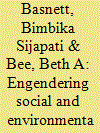

|
|
|
|
|
| Summary/Abstract |
Drawing on feminist and development literature, this paper suggests several important lessons and considerations for building equitable approaches to REDD+. Specifically, we illustrate the conceptual and practical significance of women’s participation for achieving the goals of REDD+as well as the limits and opportunities for gendering participation in REDD+. We argue that the standing debates over how and in what context gender becomes instrumentalised, technicalised or institutionalised in development provide important cautionary tales for the implementation and reporting of REDD+safeguards. By doing so, this paper contributes to the growing literature on gender, development, natural resource management and REDD+.
|
|
|
|
|
|
|
|
|
|
|
|
|
|
|
|
| 4 |
ID:
152083
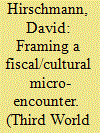

|
|
|
|
|
| Summary/Abstract |
This article focuses on the performance of the calypso song ‘VAT on You’, as a response to the introduction into Dominica of the value added tax (VAT). The article applies a set of concepts to frame and so enhance our understanding of the event in terms of global history. Both calypso and VAT have extended histories and this performance represents an unusual meeting of earlier and current forces of globalisation. The conclusion assesses the helpfulness of the framing concepts ‘longue durée,’ continuities, centring, class divisions and micro-resistance, and assesses the song’s contribution to such resistance
|
|
|
|
|
|
|
|
|
|
|
|
|
|
|
|
| 5 |
ID:
152087
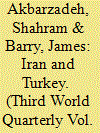

|
|
|
|
|
| Summary/Abstract |
The rise and subsequent erosion of friendly relations between Iran and Turkey was a result of their regional ambitions. While Turkey had long seen its secular system as presenting an alternative to Iran’s Islamic ideology, the alignment of their regional interests facilitated a rapport between the two states in the first decade of the twenty-first century. However, the Arab Spring proved divisive for this relationship as each state sought to advocate its model of government and secure a leadership role in the Arab world. The war in Syria widened the divide, as Iran’s long-standing support for the Bashar al-Assad regime could not be reconciled with Turkey’s desire to see President Assad out of office. Using a close reading of Persian and Turkish sources, the authors will analyse the Iran–Turkey divide, focusing specifically on how the Iranians have portrayed it as a clash of civilisations, citing Turkey’s so-called ‘neo-Ottoman’ ambitions as the primary cause.
|
|
|
|
|
|
|
|
|
|
|
|
|
|
|
|
| 6 |
ID:
152082


|
|
|
|
|
| Summary/Abstract |
Since 2009 the USA and the Bolivian government have been trying to fix their broken diplomatic relations. These negotiations culminated in 2011 in the signing of a bilateral agreement but, ultimately, failed to establish a basis for mutually acceptable development aid relations. This article analyses these negotiations and suggests a partial explanation that accounts for their dynamics and results. Specifically it shows how the negotiations have pitted Bolivian demands for state sovereignty and mutual respect, based on an egalitarian understanding of inter-state relations, against the US emphasis on common obligations and universal rights, informed by a non-egalitarian notion of liberal hegemony.
|
|
|
|
|
|
|
|
|
|
|
|
|
|
|
|
| 7 |
ID:
152080
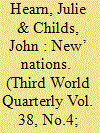

|
|
|
|
|
| Summary/Abstract |
Recently there have been increasing instances of the return of the state as the central agent of development in resource-rich nations globally. Characterised by both a rhetorical and substantive commitment to increasing control over national resource revenues, this so-called new/neo-extractivism has attracted a debate concerning the extent to which it offers a viable alternative to the imperatives of neoliberal resource extraction. Using two examples, this paper analyses the ways in which the Ghanaian and Ecuadorean states discursively imagine such structural transformations. It highlights the value in analysing the politics of language for strengthening studies of neo-extractivism.
|
|
|
|
|
|
|
|
|
|
|
|
|
|
|
|
| 8 |
ID:
152089
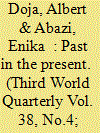

|
|
|
|
|
| Summary/Abstract |
In this article, we explore various forms of travel writing, media reporting, diplomatic record, policy-making, truth claims and expert accounts in which different narrative perspectives on the Balkan wars, both old (1912–1913) and new (1991–1999), have been most evident. We argue that the ways in which these perspectives are rooted in different temporalities and historicisations and have resulted in the construction of commonplace and time-worn representations. In practical terms, we take issue with several patterns of narratives that have led to the sensationalism of media industry and the essentialisation of collective memory. Taken together as a common feature of contemporary policy and analysis in the dominant international opinion, politics and scholarship, these narrative patterns show that historical knowledge is conveyed in ways that make present and represent the accounts of another past, and the ways in which beliefs collectively held by actors in international society are constructed as media events and public hegemonic representations. The aim is to show how certain moments of rupture are historicised, and subsequently used and misused to construct an anachronistic representation of Southeast Europe.
|
|
|
|
|
|
|
|
|
|
|
|
|
|
|
|
| 9 |
ID:
152081
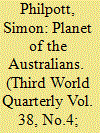

|
|
|
|
|
| Summary/Abstract |
This article examines the Australian Football League’s (AFL) diplomatic efforts to bring about recognition and reconciliation between Indigenous and non-Indigenous players, and to make a broader contribution to inter-communal relations. The AFL’s primary diplomacy has focused on classical racism, dealing with instances of on-field abuse of players by other players and with spectator education about racism and Indigenous culture in Australia. Despite successes in these areas, the AFL has notably failed to acknowledge structural, institutionalised modes of discrimination and exclusion, with the result that the sport remains deeply influenced by colonial thought and discourse concerning Indigenous Australians.
|
|
|
|
|
|
|
|
|
|
|
|
|
|
|
|
| 10 |
ID:
152085


|
|
|
|
|
| Summary/Abstract |
This paper explores the relationship between ground rent, production and knowledge in Ecuador’s neo-structuralist, state-led project to transform the productive matrix. Based upon insights from the Marxian approach to the critique of political economy, we interrogate how neo-structuralism has conceptualised the relationship between ‘natural resource income’ and ‘knowledge-based’ economic development. The paper argues that a rent-theoretical perspective, which takes seriously the regional unfolding of uneven geographical development in Latin America, can highlight the limits of a national development plan conceived according to the logic of Schumpeterian efficiency. In doing so, the paper identifies the contradictory relationship between natural resource exports, state-led ‘knowledge’-based development and capital accumulation. On this basis the paper offers a historically and empirically informed critical analysis of selective import substitution industrialisation and vanguard science and technology strategies designed to transition Ecuador away from primary resource dependence.
|
|
|
|
|
|
|
|
|
|
|
|
|
|
|
|
| 11 |
ID:
152086
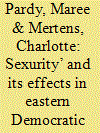

|
|
|
|
|
| Summary/Abstract |
Newly recognised as a threat to global peace and security, sexual violence in conflict is now a fixed item on international security agendas. This marks significant progress for women, gender equality and the integrity of peace programmes. Our aim here, however, is to reflect upon the risks that inhere in this accomplishment. Through the concept of ‘sexurity’, a tripartite amalgam of the securitisation of sexual violence, the sexualisation of security, and the language of crisis, we outline the adverse effects of tethering sexual violence to security. This article concerns itself with the material and symbolic effects of ‘sexurity’ for eastern Democratic Republic of Congo (DRC). It first outlines ‘sexurity’ and the context of its emergence before, drawing on fieldwork in eastern DRC, the second part underlines the effects of ‘sexurity’ for the country.
|
|
|
|
|
|
|
|
|
|
|
|
|
|
|
|
| 12 |
ID:
152076


|
|
|
|
|
| Summary/Abstract |
This article discusses the assumptions underlying state-building efforts and the effects of these efforts. It addresses two main questions: why has state building not led to the establishment of effective states? And what are the effects of statebuilding? It is argued that these efforts have been based on an institutionalist model of the state derived from a Weberian framework, and that the basic reason why state building has failed is that the creation of effective states requires the creation of state-centred societies, where both material and symbolic resources are concentrated in the state. This is very difficult to achieve for external actors. But, although state building has not achieved the kinds of effects associated with effective states, it has nevertheless had significant effects. These include, first, accentuating the patrimonialism which has led to state weakness in the first place; second, reductions in national sovereignty as external actors’ substantial influence on policy agendas renders the state itself subject to control and regulation by actors external to it; and, third, perpetuating the idea of the state, while undermining the possibility of creating actual states which conform to this idea.
|
|
|
|
|
|
|
|
|
|
|
|
|
|
|
|
| 13 |
ID:
152084
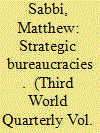

|
|
|
|
|
| Summary/Abstract |
The influence wielded by international development actors in Global South bureaucracies remains enormous. These actors actively shape the policy-making practices and funding of local state bureaucracies. Nevertheless, local bureaucracies have become adept at strategically appropriating that influence to their own benefit and to appear legitimate in order to exact development funds for their everyday tasks. Empirical data from two local self-governing areas in Ghana show that attempts towards gaining legitimacy are not only influenced by self-interest but also by external development funds seeking to promote the performance of the local state. Despite numerous institutional changes to enhance participation, the daily tasks of the local political structures tend rather to focus on assessments and qualification for development funds. Although these funds add to the local resource pool, at the same time they inhibit the realisation of the local state’s grandiose promise of reforms promoting participatory development.
|
|
|
|
|
|
|
|
|
|
|
|
|
|
|
|
| 14 |
ID:
152088


|
|
|
|
|
| Summary/Abstract |
At the Olympic Games, there is an increasing gap between developed countries that are investing more and more government resources into sporting success, and developing countries that cannot afford the “Gold War”, and are just spectators in the medal race. Based on studying a representative case, Lebanon, I investigate issues and interests of developing countries in the Olympics. On the political level, the main motivation for participation is global recognition. On the sporting level, developing countries seek to use Olympic participation as preparation for regional Games where success is more likely, serving as a soft power tool for regional influence.
|
|
|
|
|
|
|
|
|
|
|
|
|
|
|
|
|
|
|
|
|